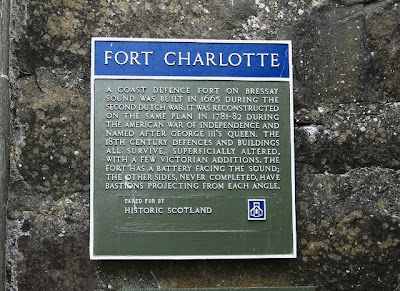Lerwick is a small town (~7500) but a surprisingly rich one in historical and cultural terms. It's anyway the main town for 350 Km around - to the north (Tórshavn, Faroé), to the east (Bergen, Norway), to the south (Aberdeen).
The town's skyline from the sea
That remoteness in sub-arctic Atlantic gives Lerwick a further importance as the fishing industry is a major activity for the town and in fact for the UK. It's also a port-of-call for some cruise ship tours.
Tourism has also increased in recent years
As a town, Lerwick is not very old: the settlement only started to grow in the 18th. century. Before that, Scalloway was the most important village in the islands. It's just a few miles west, and has its own active harbour.
Lerwick's small boat harbour and the Lodberries
In recent years, Lerwick's growth is powered by its fishing fleet, the knitwear industry and the oil platforms in North Atlantic. The town may look oldish, but is in fact a very young one.
The sailing club is quite active
Significant buildings in Lerwick include
- Lerwick's Town Hall
- The Old Tolbooth
- The Garrison theater
- Fort Charlotte
- The Shetland Library
- The Lodberries and Queens Hotel
- Shetland Museum and Archives
- The Lanes
- The Clickimin Broch
The town Hall was built in 1883.
The Council Chamber is decorated with remarkable stained glass windows.
The Council Chamber
The old Tolbooth
Located on a corner of Commercial street and Church street, overlooking the harbour, the building dates from 1767.
'Tolbooth' was an administration center and court-room, it served later as post-office, Fishermen's Mission, Red Cross Society office, and now is a shore-station and shop.
The top floor originally contained one large room, used for functions such as Masonic Lodge meetings, and two small prison cells. The two rooms on the ground floor were used as a courtroom and schoolroom, the latter converted to the sheriff-clerk's office in about 1825.
It was recently renovated on a large scale. It is now home to Britain's busiest lifeboat station.
Commercial Street, the Toolboth main entrace at left and Queen Hotel in the background.
The Garrison Theater
Built in 1903.
In Lerwick’s old town Market Street, The Garrison hosts a varied annual programme of live theatre, stand up comedy, concerts, pantomine, and dance.
Fort Charlotte
The Lodberries
The Lodberries are merchant buildings dating back to 17th/18th centuries.
These were houses and warehouses sitting on their own piers so that
goods could be loaded and unloaded directly from the boats.
The Lodberries are located at the southern end of Commercial Street.
The Shetland Library and Archive (old St. Rigan's church)
The Shetland Library is installed in the former St. Ringan’s Church.
Detail of a stained glass window.
The Shetland Museum
The Shetland Museum and Archives is located in the Hay's quay area.
Hay's Quay
The Monk Stone
One of its treasures is this impressive stone panel, known as “The Monk Stone”, identified as a Pictish altar with a carving of Christian missionaries.
Another rare piece is this Luder– a signaling trumpet made from a cow’s horn, the only navigation device other than a compass that fishermen had far from land.
The Museum also displays traditional Shetland knitwear, mainly from Fair Isle.
Finally, also in display is the last original sixareen (six-oared boat) – the Far Haaf, which waited nearly 50 years to be displayed.
The Lanes
A network of narrow lanes, or closses, connects Commercial Street with Hillhead.
Law Lane, one of the most well preserved, has a view to downtown and the sea
Houses of Lerwick
The typical roof and chimney over garret windows of Lerwick houses.
One of the most common styles is the so-called Haa houses - thick walled, rectangular, tall, narrow, gabled buildings, often with pronounced garrets and crow-stepped gables (see the Garrison theater above).
The Broch of Clickimin
The Broch of Clickimin (or Clickimin broch) is a large and well preserved broch near Lerwick. Originally built on an island in a small loch, the structure contains a later wheelhouse.
It is situated within a walled enclosure and, unusually for brochs, features a large "blockhouse" between the opening in the enclosure and the door of the broch itself.
--------------------------------
Before leaving Lerwick, a visit to to the Peerie Shop for some knitwear - may be a fabulous Fair Isle jumper - and coffee with a cake at the side café.



































